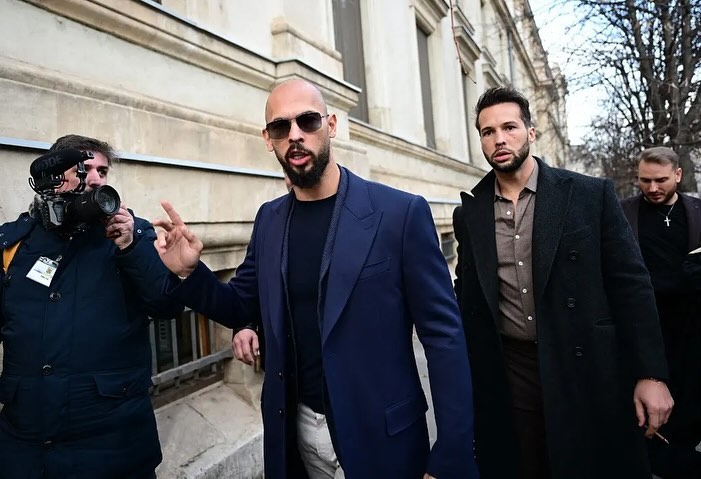Andrew and Tristan Tate Ordered to Pay Over £2 Million for Tax Evasion
Andrew and Tristan Tate, the polarizing social media influencers and online entrepreneurs, have been ordered to pay more than £2 million in unpaid taxes following a court ruling that brands them as "serial tax evaders." The decision, made by Chief Magistrate Paul Goldspring at Westminster Magistrates’ Court, is a significant blow to the brothers, who have amassed millions from their controversial online ventures and extravagant lifestyle.
The ruling stems from a civil lawsuit initiated by Devon and Cornwall Police, aiming to recover unpaid taxes linked to the brothers’ online enterprises, including Cobratate, Hustlers University, and The War Room, as well as their use of platforms like OnlyFans. The court found that the brothers had failed to pay taxes on over £21 million in earnings between 2014 and 2022, employing complex financial schemes to evade their obligations.
How the Case Unfolded
Prosecutors presented damning evidence of the Tates’ financial activities, describing a convoluted system of fund transfers across seven frozen bank accounts in the UK. Dubbed a "spaghetti trail" by Sarah Clarke KC, the prosecutor representing law enforcement, these transactions allegedly obscured the distinction between taxable income and personal funds.
Clarke detailed how the brothers moved money through payment platforms like Stripe and then into personal accounts, creating an opaque financial structure. She argued that this setup was emblematic of tax evasion and money laundering practices.
Adding to the evidence was a video in which Andrew Tate openly declared, “When I lived in England, I refused to pay tax,” and advised followers to “ignore, ignore, ignore because in the end they go away.” This statement, prosecutors argued, underscored the brothers’ blatant disregard for tax laws.
Luxury Lifestyles and Questionable Practices
The Tates are widely recognized for their ostentatious displays of wealth. From private jets to high-end sports cars, their social media profiles paint a picture of unrestrained luxury. However, the court heard that this lifestyle was built on a foundation of unpaid taxes and a lack of financial transparency.
Sarah Clarke KC told the court, “One of the reasons they possess all of these assets is that, unlike others, they believe they are exempt from paying taxes.”
Despite these allegations, the Tates’ lawyer, Martin Evans KC, defended their financial practices, stating that the use of payment platforms and multiple accounts was a standard operational necessity for online businesses. Evans argued that there was no intent to obscure funds, as the money was ultimately deposited into accounts registered in the Tates’ own names.
The Bigger Picture
The Tate brothers’ tax evasion case shines a spotlight on the regulatory challenges posed by the rise of online entrepreneurs and influencers. Operating across multiple jurisdictions, these digital personalities often leverage global platforms to generate substantial income, complicating the enforcement of tax laws.
For authorities, the Tates’ case represents a victory in holding high-profile figures accountable. It also raises questions about the adequacy of current tax enforcement mechanisms in an increasingly digital and borderless economy.
Broader Legal Troubles
The financial ruling comes amid a backdrop of more severe legal issues for Andrew Tate. In Romania, he is currently on trial for alleged human trafficking, rape, and establishing a criminal organization aimed at exploiting women. These charges add to the growing list of controversies surrounding the brothers, further tarnishing their public image.
Prosecutors in the UK have also emphasized the brothers’ history of disregarding financial and legal norms. Clarke pointed out that apart from a single declaration in Romania for a company named Talisman Enterprises—dismissed as a “work of fiction”—the brothers have shown no effort to comply with tax regulations in any jurisdiction.
Frozen Assets and Financial Fallout
The court has frozen multiple bank accounts linked to the Tates, with over £2 million earmarked for recovery. These frozen accounts are only the tip of the iceberg, as the authorities continue to scrutinize the brothers’ financial dealings.
The confiscation order could severely impact the Tates’ operations, particularly their online business ventures. The brothers have yet to comment publicly on the ruling, but their legal team is expected to appeal the decision, prolonging their battle with tax authorities.
Related: Jason Kelce Cleared of Charges in Penn State Phone Incident
Industry Implications
The case sets a precedent for how governments and regulators approach tax compliance in the influencer and online entrepreneur space. As digital income streams become more common, cases like the Tates’ highlight the need for stronger regulatory frameworks to ensure that high-income individuals contribute their fair share.
Moreover, the outcome of this case may serve as a cautionary tale for other influencers who neglect their tax responsibilities, showing that authorities are willing to take decisive action against noncompliance.
The £2 million ruling against Andrew and Tristan Tate is a significant milestone in their ongoing legal troubles. It not only highlights the brothers’ alleged financial misdeeds but also serves as a broader commentary on the challenges of regulating digital income.
As the Tates face increasing legal and financial pressures, their once-glamorous lifestyle may become increasingly difficult to sustain. Meanwhile, authorities are sending a clear message: no one, not even high-profile influencers, is above the law.














